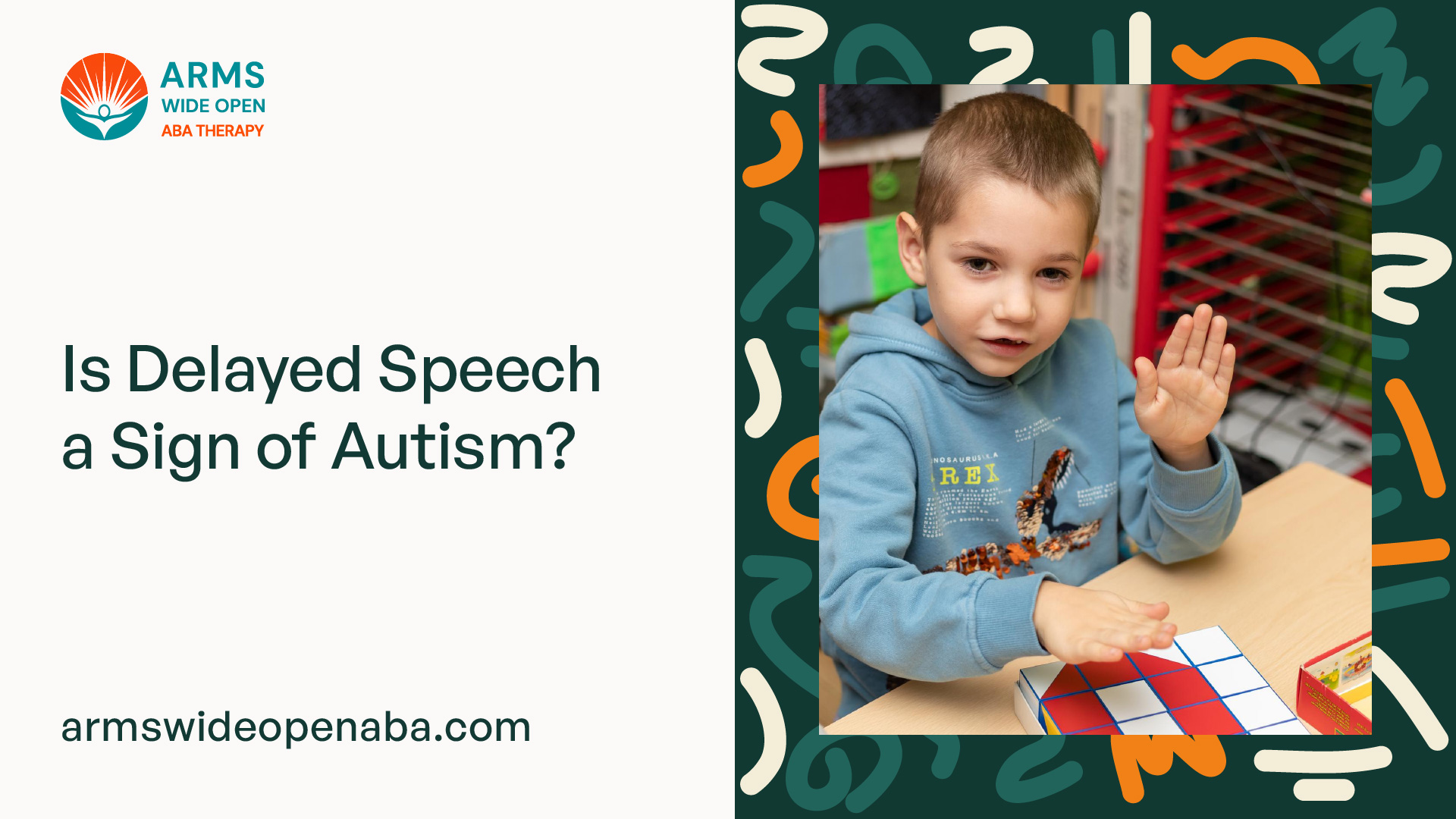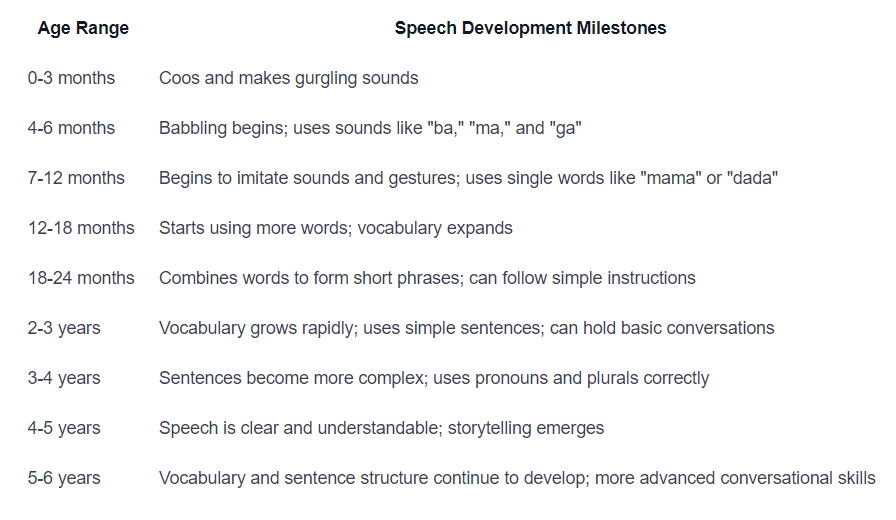Is Delayed Speech a Sign of Autism?
Unraveling the connection: Is delayed speech a symptom of autism? Explore the relationship and find answers here.

Understanding Delayed Speech and Autism
When it comes to speech development and autism, understanding the connection between the two is crucial. In this section, we will explore the definition of delayed speech and provide an overview of Autism Spectrum Disorder (ASD).

Definition of Delayed Speech
Delayed speech refers to a delay or impairment in a child's ability to develop language skills within the expected timeframe. It is important to note that every child develops at their own pace, and there is a wide range of normal variation in speech development. However, delayed speech becomes a concern when a child significantly lags behind their peers in acquiring language skills.
To determine if a child's speech is delayed, professionals often refer to speech development milestones, which indicate the expected age at which children typically achieve specific language skills. These milestones can vary slightly, but they provide a general guideline for monitoring a child's speech development.
Overview of Autism Spectrum Disorder
Autism Spectrum Disorder (ASD) is a neurodevelopmental disorder that affects social interaction, communication, and behavior. It is characterized by a wide range of symptoms and can vary in severity from person to person. While delayed speech is not always indicative of autism, it is considered one of the potential red flags for the disorder.
Individuals with autism may experience challenges with both verbal and nonverbal communication. Some children with autism may exhibit delayed speech or have difficulties expressing themselves verbally. It's important to note that not all individuals with autism experience delayed speech, as speech development can vary greatly among individuals on the autism spectrum.
To understand the relationship between delayed speech and autism, it is crucial to consider other common symptoms and behaviors associated with ASD. These can include repetitive behaviors, restricted interests, difficulty with social interactions, sensory sensitivities, and challenges with understanding and expressing emotions.
By understanding the connection between delayed speech and autism, parents, caregivers, and healthcare professionals can monitor speech development and identify potential indicators of autism. Early identification and intervention play a vital role in supporting children with delayed speech and ensuring they receive the appropriate evaluation and support services they may need.
Signs of Delayed Speech
Recognizing the signs of delayed speech is crucial for early identification and intervention. While every child develops at their own pace, there are certain typical speech development milestones that can be used as a general guide. It's important to keep in mind that the absence of these milestones does not necessarily indicate a cause for concern, but it may warrant further evaluation.
Typical Speech Development Milestones
The following table provides an overview of typical speech development milestones in children:

Red Flags for Delayed Speech
While each child develops at their own pace, there are certain red flags that may indicate delayed speech or language development. It's important to consult with a healthcare professional or speech-language pathologist if you observe any of the following:
- Lack of babbling or limited vocalizations by 12 months
- No single words by 16-18 months
- Inability to follow simple instructions
- Difficulty understanding or responding to questions
- Limited vocabulary or difficulty forming sentences
- Persistent difficulty with speech sounds or articulation
- Regression in speech or language skills
If your child exhibits any of these red flags or if you have concerns about their speech and language development, it is recommended to seek an evaluation from a healthcare professional or a speech-language pathologist. Early intervention and support can play a crucial role in addressing delayed speech and promoting optimal communication skills.
Understanding the signs of delayed speech and being proactive in seeking evaluation and intervention can help children with or without autism spectrum disorder to reach their full communication potential.
Relationship Between Delayed Speech and Autism
When it comes to understanding delayed speech in children, one question that often arises is whether it is a sign of autism. In this section, we will explore the link between delayed speech and autism, as well as other common symptoms associated with autism.
Link Between Delayed Speech and Autism
Delayed speech can be one of the early signs of autism spectrum disorder (ASD). Many children with autism experience challenges in language development, including delayed speech or language milestones. However, it's important to note that not all children with delayed speech have autism, and not all children with autism have delayed speech.
Research has shown that a significant number of children with autism exhibit speech delays. According to the Centers for Disease Control and Prevention (CDC), around 40% of children with ASD have difficulty in acquiring speech skills at the expected age. It's important to remember that each child is unique, and the presence of delayed speech alone does not necessarily indicate autism. A comprehensive evaluation by a healthcare professional is necessary to determine the underlying cause.
Other Common Symptoms of Autism
In addition to delayed speech, there are other common symptoms associated with autism. These symptoms may vary in severity and can manifest differently in each individual. Some of the key characteristics often observed in individuals with autism include:
- Social communication challenges: Difficulty in engaging in reciprocal conversations, understanding nonverbal cues, and establishing and maintaining relationships.
- Restricted and repetitive behaviors: Engagement in repetitive movements or behaviors, resistance to change, and a strong preference for routine.
- Sensory sensitivities: Heightened or diminished sensitivity to sensory input, such as sound, touch, taste, or smell.
- Cognitive and developmental differences: Differences in learning and cognitive abilities, as well as delays in reaching developmental milestones.
It's important to remember that the presence of these symptoms does not solely determine a diagnosis of autism. A comprehensive evaluation conducted by medical professionals, such as pediatricians, psychologists, or developmental specialists, is necessary to assess all aspects of a child's development and determine whether autism is present.
Understanding the relationship between delayed speech and autism can help parents and caregivers recognize potential red flags and seek appropriate evaluations and interventions. Early identification and intervention play a crucial role in supporting children with autism and promoting their overall development.
Diagnosis and Evaluation
When it comes to understanding delayed speech and its potential connection to autism, a comprehensive diagnosis and evaluation process is crucial. This section discusses the assessment of speech delays and the autism evaluation process.
Assessing Speech Delays
Assessing speech delays requires a thorough evaluation by professionals who specialize in speech and language development. They will consider various factors such as the child's age, developmental history, and individual differences. The assessment may involve the following:
- Case History: Gathering information about the child's medical history, family history, and developmental milestones.
- Hearing Evaluation: Assessing the child's hearing abilities to rule out any hearing impairments that may impact speech development.
- Language Assessment: Evaluating the child's receptive and expressive language skills, including their understanding and use of words, sentences, and grammar.
- Articulation Assessment: Examining the child's ability to produce speech sounds and determine if any speech sound errors are present.
- Oral-Motor Examination: Assessing the child's oral structures and movements to identify any physical factors that may contribute to speech delays.
Through these assessments, speech-language pathologists and other professionals can gain valuable insights into a child's speech delays, helping to determine the appropriate course of action and potential need for further evaluation.
Autism Evaluation Process
When delayed speech is observed alongside other developmental concerns, an evaluation for autism spectrum disorder (ASD) may be warranted. The autism evaluation process typically involves a team of professionals, including psychologists, developmental pediatricians, and speech-language pathologists. The evaluation may consist of the following components:
- Observation and Interaction: Professionals observe the child's behavior and social interactions to assess their communication skills, social reciprocity, and repetitive behaviors.
- Parent and Caregiver Interviews: Gathering information from parents and caregivers about the child's developmental history, behaviors, and concerns.
- Standardized Assessments: Utilizing standardized assessment tools to evaluate various domains, including communication, social interaction, and repetitive behaviors.
- Medical Evaluation: Ruling out any medical conditions or genetic disorders that may contribute to the observed developmental delays.
- Developmental Assessment: Assessing the child's overall developmental functioning, including cognitive abilities, motor skills, and adaptive behavior.
It's important to note that the autism evaluation process may vary depending on the healthcare provider and the specific needs of the child. The goal of this evaluation is to determine whether the child meets the criteria for an autism spectrum disorder diagnosis and to provide appropriate recommendations and interventions tailored to their individual needs.
Through the assessment of speech delays and the evaluation process for autism, professionals can gather valuable information to better understand a child's unique communication profile and provide the necessary support and interventions for their development.
Interventions and Support
When it comes to addressing delayed speech in children with autism, early intervention programs and speech therapy play crucial roles in providing support and fostering communication skills. These interventions aim to enhance communication abilities, promote social interaction, and improve overall quality of life for children on the autism spectrum.
Early Intervention Programs
Early intervention programs are designed to identify developmental delays and provide targeted support as early as possible. These programs involve a multidisciplinary approach, with professionals such as speech-language pathologists, occupational therapists, and behavior analysts working together to create individualized intervention plans.
The goal of early intervention programs is to address the specific needs of children with delayed speech and autism. These programs often incorporate evidence-based practices, structured play activities, and strategies for improving communication skills. Through early intervention, children can receive the support they need to develop language and communication skills, which can have a positive impact on their long-term development.
Speech Therapy for Children with Autism
Speech therapy is a vital component of intervention for children with delayed speech and autism. Speech-language pathologists (SLPs) specialize in assessing and treating communication disorders, including speech and language delays in children on the autism spectrum.
In speech therapy, SLPs work closely with children to target specific communication goals. These goals may include improving articulation, expanding vocabulary, enhancing social communication, and developing pragmatic language skills. SLPs use a variety of techniques and strategies tailored to the individual needs of each child.
Speech therapy for children with autism often involves the use of visual supports, such as picture cards or visual schedules, to facilitate understanding and communication. SLPs may also incorporate play-based activities and technology-assisted interventions to engage and motivate children during therapy sessions.
The frequency and duration of speech therapy sessions may vary depending on the needs of the child. Regular and consistent therapy sessions, along with home-based activities and strategies, can help children with delayed speech and autism make significant progress in their communication skills.
By implementing early intervention programs and providing speech therapy, children with delayed speech and autism can receive the necessary support to improve their communication abilities and enhance their overall development. These interventions play a vital role in empowering children to effectively communicate, interact with others, and navigate the world around them.
Early intervention is crucial for children with speech delays or autism, as it can significantly impact their long-term outcomes. By identifying and addressing communication challenges early on, children can develop the skills they need to express themselves, understand others, and form meaningful relationships. Speech therapy, in particular, is an essential component of early intervention programs.
Speech therapists are trained professionals who work with children to assess their communication abilities, identify areas of difficulty, and develop personalized treatment plans. They use a variety of techniques and strategies to help children improve their speech, language, and social communication skills. This may include exercises to strengthen the muscles used for speech, activities to promote language comprehension and expression, and tools to facilitate nonverbal communication, such as picture exchange communication systems (PECS) or augmentative and alternative communication (AAC) devices.
In addition to speech therapy, early intervention programs often incorporate other supportive services, such as occupational therapy, physical therapy, and behavioral therapy. These multidisciplinary approaches help address the unique needs of each child, promoting their overall development and well-being.
By providing children with delayed speech and autism the support they need during their critical early years, we can help them build a strong foundation for future success. These interventions not only improve communication abilities but also foster social skills, emotional regulation, and cognitive development. As a result, children are better equipped to engage with their peers, participate in educational settings, and lead fulfilling lives.
It is essential for parents, caregivers, and healthcare professionals to be aware of the signs of speech delays and autism, and to seek early intervention services as soon as concerns arise. By working together and providing comprehensive support, we can ensure that every child has the opportunity to reach their full potential and thrive in their communities.
Sources
https://www.verywellhealth.com/is-late-speech-a-sign-of-autism-259888#
https://presence.com/insights/signs-your-childs-speech-language-delay-could-be-autism/
https://www.autismparentingmagazine.com/speech-delay-vs-autism/
Similar articles
We’re here to help you

Our team is here to assist you in this process. Contact us for any assistance.
it’s easy to apply
We Accept Most Insurances
Our in-network insurance partnerships make ABA therapy more accessible to families throughout our service areas.







Our Insurance Process
We'll request your insurance details to help us verify your plan's coverage for ABA therapy. Once we've received this information, we'll walk you through your benefits, including copayments, deductibles and out-of-pocket maximums, so you know what to expect in advance.
Our team will then handle the preauthorization and all the necessary paperwork.
.svg)





















.jpeg)


































.jpeg)




.jpeg)







.jpeg)











.jpeg)
















